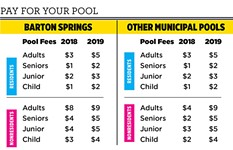Point Austin: One, Two, Many Occupations
A movement being born is many things
By Michael King, Fri., Nov. 11, 2011

That's one reason we've been doing ongoing coverage of Occupy Austin by means of the accumulating photos on our website gallery, which week to week have portrayed the movement as it develops. Most of these portraits in time are by staff photographer Jack Anderson, who's been personally dedicated to the project, with contributions from Jana Birchum as well. There's also a brief but illuminating video produced by Katie Tomasino, which through interviews with Austin participants – a Marine, a registered nurse, a social worker and grandmother – gives a quick portrait of the range of people identifying as Occupiers and instantly upends the usual media stereotypes.
For the most part, the local version of Occupy has been (in the Austin fashion) unsurprisingly laid-back, with the glaring exception of the Halloween weekend arrests by the Austin Police Department (see "Halloween Crackdown on Occupy Austin," Nov. 4). That episode could likely have been avoided with some creative thinking on both sides, and in the days since, the city and the Occupiers have restored a tentative truce. The city has adjusted some of its practices, and the Occupiers (with some push-back) have largely deferred to the regulations governing the use of the City Hall grounds. Considering the mass (and occasionally violent) arrests in other cities, Austin's experience has been relatively peaceful and effective, and the core camp has become in effect a staging area for targeted weekend protests: solidarity with Occupy Oakland, Bank Transfer Day, etc., drawing into action and solidarity hundreds of working people who cannot otherwise participate every day.
Pay Now or Pay Later
This week, the question of enforcement cost was raised at the Public Safety Commission, estimating roughly $110,000 in police overtime expenses related to the protest. That's not insignificant, but as it happens, I spent Saturday afternoon trying to drive across town just as the UT football game concluded and Fun Fun Fun Fest was in full throttle at Auditorium Shores; it was impossible to out-maneuver the traffic, east to southwest, and the situation undoubtedly caused expensive delays (and accidents). But those extra costs are unlikely to show up either as a discrete public safety expense or a Statesman headline.
Participatory democracy, especially when we're all badly out of practice, can be "expensive" in public time and treasure. Yet can anybody seriously argue that our current official ways of doing business (and politics) are improving the financial prospects of the 99%? Consider, for wretched example, our most recent legislative session – anybody care to calculate how many millions in income that retrogressive exercise cost the citizens of Austin alone?
I have much the same reaction to those who complain that the Occupiers are "leaderless" or "lack clearly defined goals." Considering the state of our official state and national leadership at the moment – with our major political institutions failing miserably to address massive and persistent unemployment, all the while pursuing endless, debilitating, and pointless wars – it's hardly surprising that a rebel movement would tend to be suspicious of any sort of leadership at all. And the latter charge, at least locally, isn't even accurate – a set of four coherent goals, duly adopted by the General Assembly, is posted prominently on Occupy Austin's website:
• This movement is about democracy. We demand that the government be truly responsive to those it represents. We demand an end to the massive corporate influence blocking the voice of the people by eliminating corporate personhood and limiting monetary contributions to political campaigns and lobbying.
• This movement is about economic security. We demand effective reforms to prevent banks and financial institutions from causing future economic crises.
• This movement is about corporate responsibility. We demand strict repercussions for corporations and institutions who cause serious financial damage to our country and its taxpayers.
• This movement is about financial fairness. We demand tax reforms to ensure that corporations and the wealthy pay their fair share in taxes.
However quixotic and difficult those demands may prove in practice, they are entirely more rational, fair, coherent, and necessary than the 10 Texas constitutional amendments so few of us voted on this week.
A Fair Deal
That's not at all to suggest the movement is beyond criticism, or that it presages a radical transformation of the national political landscape in anything approaching a short term. I've watched and participated in decades of populist uprisings, and the often directionless deliberations can be both touchingly naive and enormously frustrating. The reflexive presumption that "we are the people" can quickly founder on a refusal to acknowledge the millions of ordinary citizens who are in no position to act upon or even hear what the movement is saying. More simply, the Occupiers are undeniably a motley and disparate collection, often pulling in opposing directions – populists, anarchists, libertarians, democrats, socialists, culture warriors, even provocateurs; finding common ground among all those contradictory impulses will not happen overnight.
And in the long run, if we don't relearn once again how to politically organize workplaces – that is, to revitalize a besieged and foundering union movement, public and private – all the hortatory marches we can muster will be doomed to political and economic marginalization.
I'll give the last words to Peter Morales, an Occupier I met this week at City Hall. He's a husband and father with four children, a general contractor and home builder, and he has been spending as much time as he can taking part in Occupy Austin and trying to build a movement for economic and social justice. "We're trying to lift the blinders ... and give [people] a voice to speak. ... I think the movement has brought awareness to a lot of people. ... We are patriots; we are here to help mankind. It's not my movement; it's not his movement; it's our movement. It's the 99 percenters' movement. What we're trying to achieve – fairness – affects everybody."
Got something to say on the subject? Send a letter to the editor.












